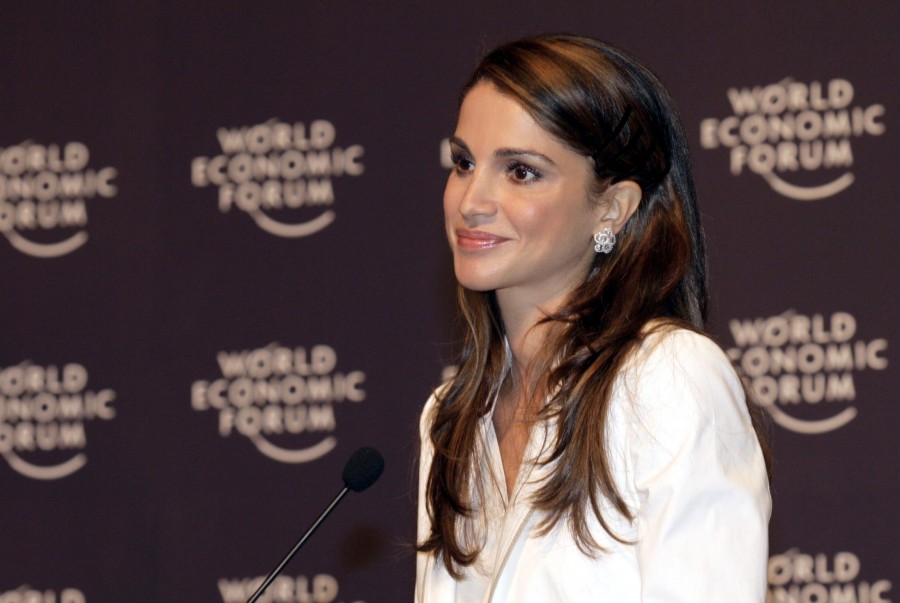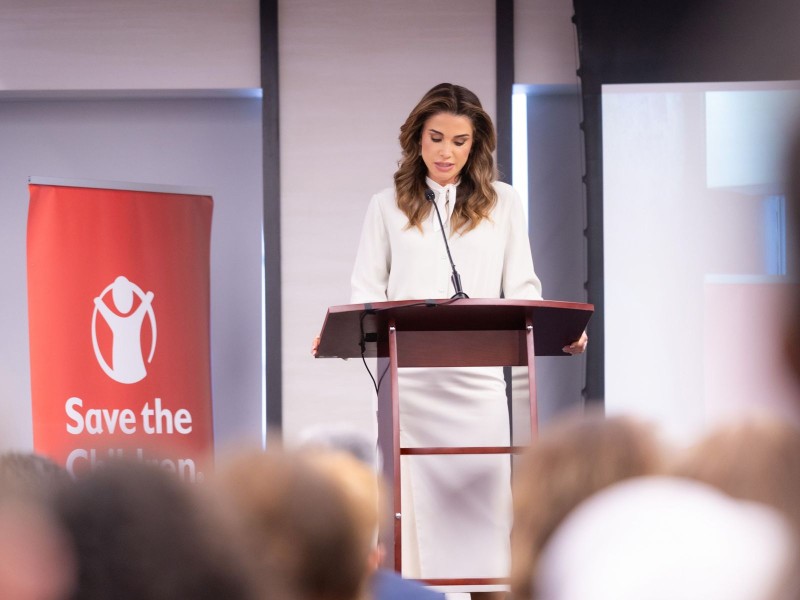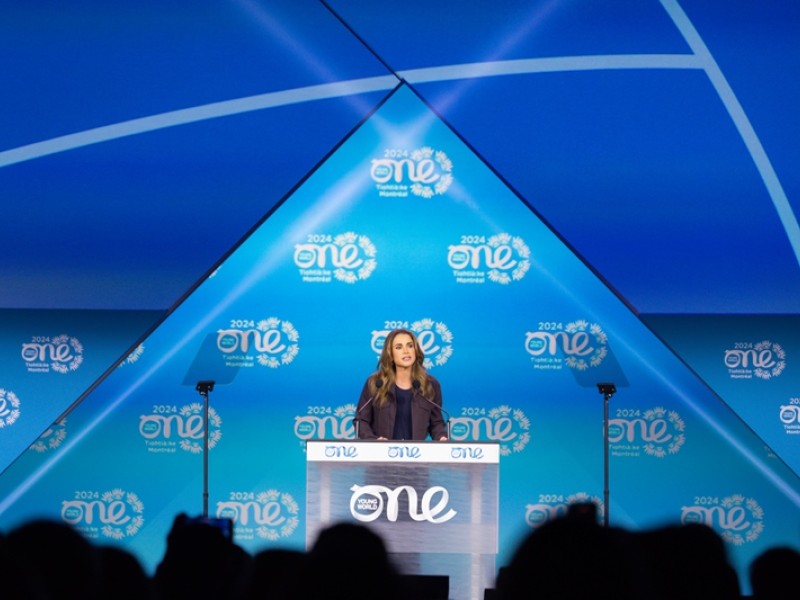Queen Rania's Speech at the Inaugural Annual Meeting of New Champions - Dalian, China

When I was first imagining what I would like to say this morning, I had the idea it would be great to start by quoting a Chinese philosopher. I knew it might seem a bit clichéd, but the temptation was hard to resist, when thinking about a culture whose ancient wisdom is so profound.
The biggest challenge was where to begin. So many brilliant scholars to choose from! At last, I settled on a book of quotations by Lau Thawz. And here is the first thing I read:
“He who speaks more is sooner exhausted.”
I had not even written my speech, and already I felt compelled to cut it back!
Which just goes to prove that ancient Chinese philosophers would have been great conference organizers as well!
Your Excellency ‘tshia deh rin’, Professor Schwab, thank you for inviting me to be part of this wonderful and timely program. It is thrilling for me to be back in this great nation and to visit Dalian for the first time.
This year marks the 30th anniversary of relations between China and Jordan. And even though Dalian is half a world from Amman, in many ways, I feel at home. In terms of relative size, Jordan may seem like a grain of sand next to China’s Great Wall. But we too have big dreams! Like China, Jordan is determined to create a future of opportunity and prosperity for our youth. Like China, we put family and education at the heart of who we are.
My husband, His Majesty King Abdullah, travels to China every year and always comes home inspired; talk of China dominates the dinner table. But, as you know, he is not the only one talking about China.
Indeed, China’s explosive growth is the headline story of our time. It seems like everywhere you turn, you see dynamism on display. The thriving businesses. The construction projects. The outreach to the world. Humanity has long been in debt to China for innovations from paper to the compass. Today, the people of China are writing a bold new chapter in their history – and navigating one of the most exciting journeys in the course of human development.
So, I salute Professor Schwab and the World Economic Forum for bringing the spirit of Davos to Dalian. Because the center of global gravity is shifting East. Asia is on the move. The confidence, energy, and momentum here are impossible to ignore – and reflected in the many business leaders in this room with roots in Asian soil.
Yet, the real shift in power we are witnessing today is about much more than geography. It is more complex than simply re-weighting the scales of the global economy, with Europe and America on one side and China and India on the other. Today, it is about the power of the individual.
That is why the WEF describes you as “a new generation of companies that will fundamentally change the global competitive landscape.” You have been called the “New Champions” – companies with the vision, leadership, and determination… to push the boundaries… re-imagine reality… and reinvent the way we live and work… in areas as varied as banking, bio-fuels, and biomedicine.
And collectively, you are helping redraw the map of global economic dynamism. But what will be the larger, lasting significance of your success? What are the special qualities and strengths new champions bring to the table? How will you use your power?
I hope the innovative future you build will reflect the timeless wisdom of the past – especially the notion of harmony and respect for one another’s dignity that lies at the foundation of Chinese culture. I have been told that the Chinese character ‘HE’, which means harmony, grace, and peace, has been found inscribed on bones and tortoise shells that date back more than 3000 years. Yet, those precious qualities – harmony and peace – are being eroded in our world today.
For all the technological advances of our time, we are connected but we are not connecting. Even as global challenges underscore our interdependence, our world remains fragmented.
We see it in the mutual misunderstanding afflicting the world’s diverse cultures, not only among different countries but increasingly within them as well. We hear tense debates over immigration, assimilation, and integration.
And for me, as an Arab, a Muslim, and a member of the global community, the schism that worries me most is the growing gulf of fear and misunderstanding between the Muslim world and the West …our failure to speak the same language…our failure to find common ground in our conversations…our failure to see eye to eye.
Take the wearing of the veil, for example. Muslims see it as an expression of piety and devotion to God, while too many in the West see only oppression and compliance.
Or the cartoons of the Prophet Mohammed (PBUH) and the controversy that followed. To Muslims it signaled blatant disrespect of our faith; to the West, an attack on their freedom of speech.
Or the issue of Palestine, where, too often, the West just sees terrorist attacks against Israelis, while the enduring image in Arab minds is one of generations of Palestinian boys and girls growing up with no country, no rights, and no future – an image that has not changed for 50 years.
Now, clearly, these are only generalizations. I do not claim to speak for the Muslim world at large, and certainly not for the West.
But I believe the perception gap is real. The gulf between narratives is wide – and only getting wider. At a time when we should be talking, and trying to see the other point of view, we are turning away.
That is why it is refreshing to come to Asia…because when people from this part of the world speak of ‘East and West’ they do so in a different kind of language… a different sort of dialogue…one that is dominated by optimism and open-mindedness…one that centers around trade and economic ties that deepen friendships.
Sadly, too often when I travel around my region, and to the West, I hear discussions about this cultural chasm dominated by words of blame and hostility, uttered in tones of mistrust and intolerance.
It seems to me that while global commerce is surging ahead, our global conversation is falling behind.
Why?
I believe we are missing the moral language of the conscience. We are missing the graceful conversation of the heart. We are missing the humanitarian perspective that helps us to see through another person’s eyes... and to empathize – person to person… neighbor to neighbor… us to them.
All of us know great moral leaders from our countries, regions and our shared histories who understood the need for such empathy. Leaders who based decisions on ethics, honesty, and the advancement of humanity.
In addressing the great injustices of their time, from poverty and inequity to division and racism, they appealed not only to logic but to simple human values like acceptance, compassion, humility and love. And they reminded us of our duty to look out for one another… and the fundamental dignity that joins each member in the family of humankind.
But today you do not have to be an iconic figure from history to make your mark…I believe each one of us can have an impact.
I believe all of us must weave that same spirit of caring not only through our public discourse, but through our boardrooms and business meetings—even on our Blackberries!
I am convinced that your voices can help change the global conversation…and reassert the basic values that are at the heart of our common humanity – the ABCs of a common language.
You can be New Champions not only of commerce, but of conciliation; not only of trade but of tolerance; and not only of profit, but of peace and understanding.
After all, many firms are already doing business in a variety of places and markets – including the Muslim world. You have already forged strong lines of communication—across boundaries of distance and experience. You know you must understand other cultures, or lose out in the race for new markets. You know you must listen as well as talk; and ask questions before assuming the answers.
You can and must play a key role in bridging the East West divide and one way in which you can do this is to be New Champions of what I call Corporate Multicultural Responsibility.
Corporate Multicultural Responsibility is more than sending some of your overseas executives on cultural competency training
It is about insisting that all your staff get as much time learning about global diversity as time management and communication skills.
It is about ensuring that your company’s strategies reflect cultural challenges alongside market, distribution and pricing considerations.
It is about breaking down cultural barriers within and out-with the firm, so the manager in the business suit really gets to know the woman in the hijab on the next floor.
Corporate multicultural responsibility is about reaffirming the healing values of humanity within the company and encouraging employees to carry them to their homes and communities.
Each of us has a role, because we are all on the same team. Because the more our world community pulls together, the more chances every nation and every individual will have to prosper.
In fact, the official slogan of the Beijing Olympics – ‘One World, One Dream’ – just four simple words - sums it up very well.
Those four words speak of the Olympic spirit of global unity, an idea that is eternally new even though its origins go back to the beginning of civilization. It is a dream that is every bit as eastern as it is western. For it was a disciple of Confucius, Mencius (pronunciation: Meng-Tzu), who wrote, “a good citizen in one community will befriend the other citizens of the community; a good citizen of the world will befriend the other citizens of the world.”
I hope that when you leave Dalian, and return to your countries, you too are infused with the Olympic spirit, and will join your voices with those of 1.3 billion Chinese people all calling for ‘One World, One Dream’… so that Beijing’s legacy to the world is more than a wonderful Olympic arena…more than words of harmony and hope, but the foundation of a new world team – one that is joined together by mutual respect, common goals, and shared understanding.
Thank you very much.
Featured
Queen Rania's official website
This website does not support old browsers. To view this website, Please upgrade your browser to IE 9 or greater
Your browser is out of date. It has known security flaws and may not display all features of this and other websites. Learn how to update your browser



